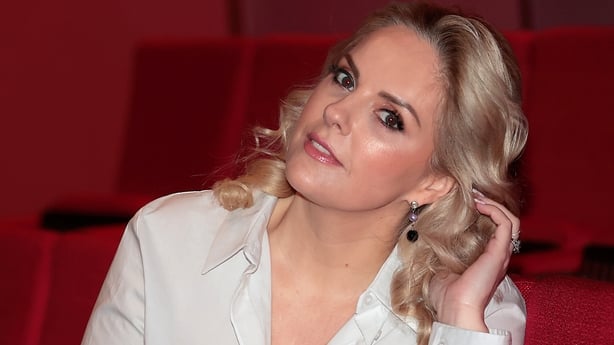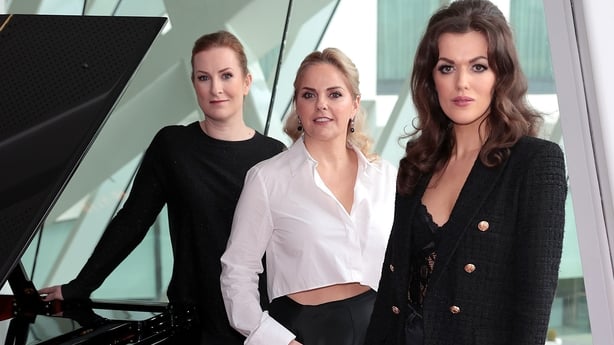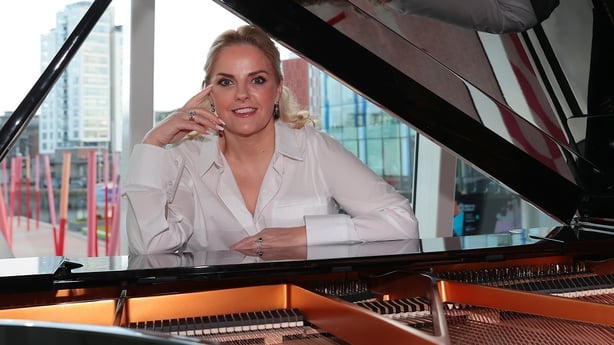Celine Byrne is no stranger to the Bord Gáis Energy Theatre - but she's really looking forward to performing in Richard Strauss’s Der Rosenkavalier. "It’s a great opera," she tells RTÉ Entertainments’s John Byrne.
Anyone who thinks opera’s just for the posh crowd has got it all wrong. If anything, it’s the new golf. Remember when that sport where a walk gets spoiled was the preserve of the wealthy, a sign of affluence and sophistication?
And besides, there’s an awful lot of scandal and stuff going on in opera. Take Richard Strauss’s ravishing Der Rosenkavalier - at the Bord Gáis Energy Theatre in March - for example. It’s all about love and lust, culture and crudity, disguise and deceit.
Right. Now, you're interested!

Raging hormones - are there any other kind? - fuel the aristocratic intrigues in this indulgently Viennese celebration of the extravagant lifestyle of a bygone age. It’s also an opera that doesn’t cut any corners.
The orchestra is sumptuous, as it should be. The sopranos soar with heart-stopping beauty. Operatic nostalgia doesn’t come any finer than this. And topping it all is a cast that includes three superb Irish sopranos. Well, okay one of them’s a mezzo-soprano, but you get the drift.
As well as being the first time since 1984 that Der Rosenkavalier has been seen in Dublin, the production features three of Ireland’s greatest singers on stage together for the first time: sopranos Celine Byrne as Marschallin, Claudia Boyle as Sophie and mezzo-soprano Paula Murrihy as Octavian.
So who better to get the lowdown from than Celine Byrne, the Kildare soprano who you may have seen on the Late Late Show Eurosong Special - and who recently made one of her regular concert appearances at Bord Gáis Energy Theatre, to talk to about this event?
John Byrne: Well Celine, I think it’s fair to say that the Bord Gáis must be like a second home to you these days?
Celine Byrne: Yeah, I'm probably the only artist that has been in the theatre every season since it opened in 2010. That's a good claim to fame, isn't it? It’s 13 years. I'm a teenager when it comes to my appearances there in an opera or playing concerts.
The very first opera that I did there was La Boheme, with the Scottish opera.

Do you have a different approach to the gig when you're doing a show or doing something like an opera? I mean, they are quite different and quite contrasting types of shows . . .
It's just a different way of communicating. With a concert, I suppose you just get up there and you’re singing. It's the same amount of effort that you put into it, like you've been at the same warm up. It doesn't matter whether you’re doing a sprint or the marathon, you still have to prepare and be physically ready for that.
So I'm physically ready for both. But with concerts, you're a little bit more exposed, you're just a little more vulnerable because it’s you. And you're trying to entertain and the pressure’s on you so that people can enjoy themselves and the reflection is on you.
So with an opera, suppose in a way it could be considered easier because you're falling into a role and the audience is watching a play as well as the music.
I think it's less daunting. I mean, it still has its difficulties, but it's less daunting because you feel that your performance is being judged somewhat, but not as much as it would be in a concert - because with an opera people are there to enjoy and to get lost in the story.
But I prefer a concert because I love chatting to people, and I love that buzz you get from an audience. It’s more personal.
Can you tell us a bit about Richard Strauss’s Der Rosenkavalier?
People say, is it an opera that you would go to if you go into an opera for the first time? Probably not, because it's not one of the popular ones. But at the same time, it is a great opera.

And I think it's a wonderful chance to experience an opera live in a theatre with a huge symphony orchestra and a brilliant cast. I mean, it's an art form in itself, you know.
When you go to the ballet, do you choose which ballet that you go to or you just go into a ballet? So it's the same for opera. You know, of course you can make a choice to go to see a popular one. This mightn’t be as popular, but still you're experiencing what it's like to go to see an opera.
Plus it's one of the more sumptuous affairs. And as you said, there's a nice big orchestra as well. So it's a little bit of a treat as well, isn't it?
I think it's great that we have opera at our doorsteps because, for instance, you know, ballet and ballet is so famous in Russia and it's so commonplace for anybody in the Russian community and for any Russians to go to the ballet. It's commonplace, it's like us going to a cinema, you know, it's that common in Russia.
So to have that opera to come to Ireland, you know, is a treat. It doesn’t happen that often. I only mention it to make the comparison of how readily available the art form is elsewhnere, comparative with Ireland.
So I would say that ballet and opera. It's not something that's to the fore in Irish culture, but it's definitely something that is increasingly accessible.
And I think that's a brilliant thing. I think that's a fantastic thing for our generations to come.
Der Rosenkabeliere is at the Bord Gáis Energy Theatre Sunday March 5, Tuesday 7, Thursday 9 and Saturday 11.
Tickets from €15 to €95 are on sale now through Ticketmaster.


